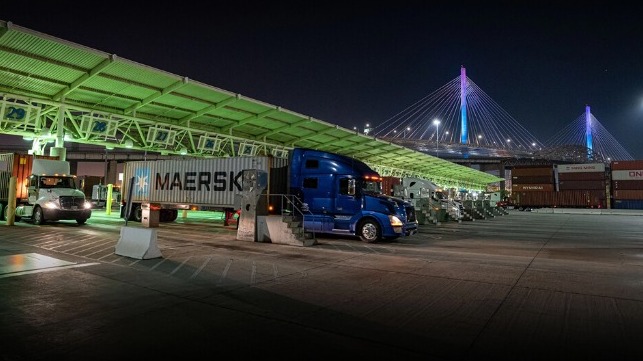SoCal Ports Plan Clean Truck Fee as Environmental Focus Increases

With local environmentalists complaining about the emissions from the ships offshore and trucks at the port during the surge in shipping activity, the City of Los Angeles as well as the ports of Los Angeles and Long Breach are continuing to focus on the need to develop infrastructure to support the transition to zero-emission shipping and port infrastructure. The Los Angeles City Council along with the ports announced new initiatives targeting emissions while others are pointing to California’s stringent environmental regulations as contributing to the current backlog at the ports.
At the state level, California already enforces strict limits on truck emissions and requirements to move an increasing about of the long-haul tractor trailers to low or zero emissions. In addition, starting in 2023, California will begin increasing regulations regarding emissions from ships at dock. The state adopted its first At-Berth regulations in 2007 and by 2027 they will phase in additional regulations for container, cruise, and reefer ships as well as car carriers and tankers.
Yesterday, in a largely ceremonial effort to emphasize the focus on zero emissions, the Los Angeles City Council voted to adopt a resolution calling on Los Angeles’ top maritime importers to commit to making all port calls to the San Pedro Port Complex on 100 percent zero-emissions ships by 2030. The resolution also requires support for legislation or administrative action to rapidly decarbonize the maritime shipping industry and to create zero-emission shipping corridors along the California coast, the West Coast of the United States, and across the trans-Pacific trade route. Los Angeles is the first city in the U.S. to adopt such a resolution.
Following through on their Clear Air Action Plan the ports of Los Angeles and Long Beach also announced that they will take the next step in the programs focusing on the transition to lower emissions from the trucks servicing both ports. In the 2017 update of their Clean Air Action Plans the ports detailed a strategy to accelerate progress toward zero-emission including the focus on trucking. They detailed a proposal in March 2020 for a Clean Truck Fund Rate to help speed the transition to zero-emission trucks.
Trucks remain the Port’s largest source of greenhouse gas emissions and the second-highest source of nitrogen oxides, a contributor to regional smog formation, notes the Port of Long Beach. Combined the two ports have reported by phasing out older, more polluting trucks, diesel emissions from trucks have been cut by as much as 97 percent compared to 2005 levels
Each port’s board recently ratified the next step which calls for both ports to begin collecting fees from all trucks hauling containers at the ports. Starting April 1, 2022, they will be charging $10 per TEU to trucks with the effort expected to raise $90 million in its first year equally split between the two ports. The monies raised will be used to fund the development of zero-emission trucks. The Port of Long Beach Commission approved an initial funding priority for both low-nitrogen oxides and zero-emission trucks with at least 10 percent of the funds to be provided to zero-emission trucks.
California’s existing restrictions on trucks have been cited by some as one of the contributors to the current shortage of trucks at the ports. The Port of Long Beach reports that only 30 trucks in the drayage fleet currently are zero-emission models. Both ports are providing some exemptions from the fee including the zero-emission trucks as well as a temporary exemption for natural-gas-powered trucks and trucks that meet or exceed California’s low NOx standard.
The Port of Los Angeles is also planning its next effort. It will soon seek proposals from local drayage companies partnering with truck manufacturers to deploy 10 zero-emissions short-haul drayage trucks that call at marine terminals and operate within a short distance (e.g., trucks operating in an approximate 25-miles radius) of the ports. A competitive process will be used to select one team for a $3 million grant toward the cost of deploying the trucks and the required infrastructure.
